Author(s)
Natasha Matteson, Amelia Groom, Lou Rosenkranz, Rachael Rakes, and Wietske Maas
The No Linear Fucking Time Bibliografie is een zich ontwikkelend naslagwerk waarin wetenschappelijke en artistieke teksten worden gebundeld die betrekking hebben op de verscheidene onderzoekslijnen binnen dit project.
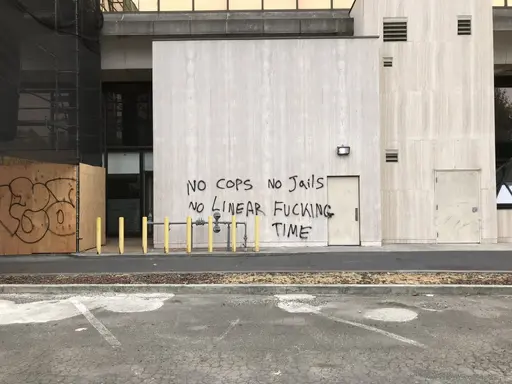
Blackness and time; Colonization of time; Cyclical time; Demise of our planet; Geologic time; Local time; Memoricide / Erasure; Nonlinear time; Retrofuturism; Speculative imaginaries; Time travel
Adam, Barbara. Timescapes of Modernity: The Environment and Invisible Hazards. Global Environmental Change Series. Oxfordshire: Taylor and Francis, Routledge, 1998.
Apocalyptic temporality; Cyclical time; Decay / entropy; Demise of our planet; Industrial time; Labor; Nonlinear time; Relativity; Rhythm; Risk; Slow violence
Adusei-Poku, Nana. “Post-Post-Black?” NKA Journal of Contemporary African Art 2016, 38–39 (November 2016), pp. 80–89. https://doi.org/10.1215/10757163-3641711.
Archive; Blackness and time; Diaspora / Displacement; Heterotemporality; Risk; The time of slavery; Time in art
Allen-Paisant, Jason. “Reclaiming Time On Blackness and Landscape.” PN Review 257, no. 3, pp. 31–34.
Blackness and time
——. Thinking with Trees. Manchester: Carcanet Press, 2021.
Blackness and time
Alliez, Eric. Capital Times: Tales from the Conquest of Time (1991); Translated by Georges van den Abbeele. Minneapolis: University of Minnesota Press, 1996.
Industrial time; Labor
Angie Morrill, Eve Tuck, and Super Futures Haunt Qollective. “Before Dispossession, or Surviving It.” Liminalities 12, no. 1 (2016), pp. 1–15.
Archive; Colonization of time; Haunting; Indigenous temporalities; Memoricide / Erasure; Settler time; Speculative imaginaries; Time in art; Time travel
Arfaoui, Meryem-Bahia. “Time and the Colonial State.” THE FUNAMBULIST MAGAZINE 36, They Have Clocks, We Have Time June 2021, https://thefunambulist.net/magazine/they-have-clocks-we-have-time/time-and-the-colonial-state.
Carceral time; Colonization of time; Local time; Memoricide / Erasure; Revolt / Revolutionary time; Settler time; Standardization; Time travel
Ayewa, Camae, and Rasheedah Phillips. “Black Quantum Futurism: ‘Black Diasporan temporalities share many parallels with quantum principles.’” CERN Collide Interviews, March 2021, https://arts.cern/article/black-quantum-futurism-black-diasporan-temporalities-share-many-parallels-quantum.
Agency; Blackness and time; Colonization of time; Heterotemporality; Local time; Memoricide / Erasure; Non-human time; Nonlinear time; Relativity; Retrofuturism; Rhythm; Settler time; Speculative imaginaries; Standardization; Time in art; Time travel
Azoulay, Ariella Aïsha. Potential History: Unlearning Imperialism. London: Verso, 2019.
Agency; Archive; Blackness and time; Colonization of time; Diaspora / Displacement; Haunting; Imperial temporality; Memoricide / Erasure; Nonlinear time; Speculative imaginaries; The time of slavery; Time in art
Bailey, Moya. “The Ethics of Pace.” South Atlantic Quarterly 120, no. 2, Crip Temporalities (April 2021), pp. 285–299. https://doi.org/10.1215/00382876-8916032
Crip time; Waiting; labor
Barad, Karen. “Troubling Time/s and Ecologies of Nothingness: Re-Turning, Re-Membering, and Facing the Incalculable.” New Formations: A Journal of Culture/Theory/Politics 92, no. 1 (2018), pp. 56–86.
Apocalyptic temporality; Colonization of time; Decay / entropy; Haunting; Memoricide / Erasure; Non-human time; Relativity; Time in art; Time travel
Baraitser, Lisa. Enduring Time. London: Bloomsbury, 2017.
Carceral time; Crip time; Cyclical time; Decay / entropy; Feminist temporalities; Haunting; Labor; Memoricide / Erasure; Psychoanalysis; Nonlinear time; Queer temporalities; Slow violence; Time in art; Time travel; Waiting
Bastian, Michelle. “Inventing Nature: Re-Writing Time and Agency in a More-than-Human World.” Australian Humanities Review 47 (2009), pp. 99–116. https://doi.org/10.22459/AHR.47.2009.10.
Agency; Cyclical time; Demise of our planet; Non-human time; Nonlinear time; Time in art; Waiting
——. “Time and Community: A Scoping Study.” Time & Society 23, no. 2 (July 2014), pp. 137–66. https://doi.org/10.1177/0961463X14527999.
Archive; Cyclical time; Diaspora / Displacement; Feminist temporalities; Heterotemporality; Local time; Memoricide / Erasure; Nonlinear time; Queer temporalities; Rhythm
Baucom, Ian. History 4° Celsius: Search for a Method in the Age of the Anthropocene. Durham, NC: Duke University Press, 2020.
Agency; Apocalyptic temporality; Blackness and time; Colonization of time; Demise of our planet; Geologic time; Heterotemporality; Industrial time; Messianic time; Non-human time; Revolt / Revolutionary time; The time of slavery; Time in art
Beacock, Ian P. “A Brief History of (Modern) Time.” The Atlantic, December 2015, https://www.theatlantic.com/technology/archive/2015/12/the-creation-of-modern-time/421419/.
Industrial time; Local time; Messianic time; Revolt / Revolutionary time; Standardization
Boudry, Pauline, Renate Lorenz, and Charlotte Laubard, editors. Moving Backwards: Pauline Boudry/Renate Lorenz. Milan: Skira, 2019.
Archive; Colonization of time; Cyclical time; Feminist temporalities; Heterotemporality; Nonlinear time; Queer temporalities; Revolt / Revolutionary time; Rhythm; Speculative imaginaries; Time in art; Time travel
Browne, Victoria. Feminism, Time, and Nonlinear History. New York: Palgrave Macmillan, 2014.
Archive; Colonization of time; Feminist temporalities; Imperial temporality; Memoricide / Erasure; Standardization; The time of slavery
Bueso, José Manuel. “Derivación Total: Tesis sobre Espacio-Tiempo Urbano / Total Drift: Theses on Urban Space-Times.” Re-visiones, no. 4 (2014). https://dialnet.unirioja.es/servlet/oaiart?codigo=6828189.
Agency; Apocalyptic temporality; Blackness and time; Colonization of time; Cyclical time; Diaspora / Displacement; Geologic time; Heterotemporality; Imperial temporality; Labor; Nonlinear time; Revolt / Revolutionary time; Risk; Settler time; Slow violence; Speculative imaginaries; The time of slavery; Time in art
Burges, Joel, and Amy Elias. Time: A Vocabulary of the Present. New York: NYU Press, 2016.
Colonization of time; Demise of our planet; Diaspora / Displacement; Geologic time; Labor; Messianic time; Non-human time; Nonlinear time; Queer temporalities; Relativity; Retrofuturism; Rhythm; Standardization; Time in art
Canaries Collective. Notes for the Waiting Room. Edited by Taraneh Fazeli, 2016. https://static1.squarespace.com/static/537c9eb6e4b0ca838c2f4f52/t/5eaafc3bc2609667f6a9ae23/1588264038420/NFTWR_LincoV5.pdf
Agency; Crip time; Demise of our planet; Feminist temporalities; Labor; Nonlinear time; Queer temporalities; Revolt / Revolutionary time; Risk; Seed time; Slow violence; Speculative imaginaries; Standardization; Time in art; Waiting
Cepeda, María Elena. “Thrice Unseen, Forever on Borrowed Time: Latina Feminist Reflections on Mental Disability and the Neoliberal Academy.” South Atlantic Quarterly 120, no. 2, Crip Temporalities (April 2021), pp. 301–320. https://doi.org/10.1215/00382876-8916046
Crip time; Pandemic time; Labor; Nonlinear time
Chan, Paul. “A Time Apart.” In Greater New York, edited by Klaus Biesenbach, pp. 84–85. New York: MoMA PS1, 2010.
Time in art
Copeland, Huey, and Meg Onli. “ABOUT TIME: Huey Copeland in Conversation with Meg Onli.” Artforum, May 2019, https://www.artforum.com/print/201905/huey-copeland-in-conversation-with-meg-onli-79522.
Agency; Archive; Blackness and time; Carceral time; Diaspora / Displacement; Heterotemporality; Industrial time; Labor; Non-human time; Nonlinear time; Queer temporalities; Retrofuturism; Revolt / Revolutionary time; Rhythm; Risk; Speculative imaginaries; The time of slavery; Time in art; Waiting
Danowski, Déborah, and Eduardo Batalha Viveiros de Castro. The Ends of the World. Translated by Rodrigo Nunes. Cambridge: Polity Press, 2017.
Agency; Apocalyptic temporality; Demise of our planet; Geologic time; Non-human time; Slow violence; Waiting
Daye, Kevin Bernard Moultrie. “Extraorthographics.” THE FUNAMBULIST MAGAZINE 36, They Have Clocks, We Have Time, June 2021, https://thefunambulist.net/magazine/they-have-clocks-we-have-time/extraorthogaphics.
Agency; Archive; Heterotemporality; Indigenous temporalities; Labor; Memoricide / Erasure; Nonlinear time; Retrofuturism; Speculative imaginaries; Standardization; Time in art
De Landa, Manuel. A Thousand Years of Nonlinear History. New York: Zone Books, 1997.
Cyclical time; Diaspora / Displacement; Geologic time; Industrial time; Non-human time; Nonlinear time; Rhythm; Seed time; Speculative imaginaries
Dean, Tim. “Bareback Time.” In Queer Times, Queer Becomings, edited by E. L. McCallum and Mikko Tuhkanen. Albany: State University of New York Press, 2011.
Agency; Crip time; Haunting; Memoricide / Erasure; Non-human time; Queer temporalities; Retrofuturism; Risk; Slow violence; Waiting
Dinshaw, Carolyn, Lee Edelman, Roderick Ferguson, Carla Freccero, Elizabeth Freeman, Judith Halberstam, Annamarie Jagose, Christopher Nealon, and Tan Nguyen. “Theorizing Queer Temporalities: A Roundtable Discussion.” GLQ: A Journal of Lesbian and Gay Studies 13, no. 2–3, Queer Temporalities (2007), pp. 177–195. https://doi.org/10.1215/10642684-2006-030.
Archive; Heterotemporality; Memoricide / Erasure; Non-human time; Nonlinear time; Queer temporalities; Retrofuturism; Speculative imaginaries
Ellis, JJJJJerome. “The clearing: Music, dysfluency, Blackness and time.” Journal of Interdisciplinary Voice Studies 5 (December 2020), pp. 215–33. https://doi.org/10.1386/jivs_00026_1.
Blackness and time; Crip time; Nonlinear time; Rhythm; Speculative imaginaries; The time of slavery; Waiting
Eshun, Kodwo. “Further Considerations of Afrofuturism.” CR: The New Centennial Review 3, no. 2 (2003), pp. 287–302. https://doi.org/10.1353/ncr.2003.0021.
Archive; Blackness and time; Diaspora / Displacement; Haunting; Memoricide / Erasure; Nonlinear time; Retrofuturism; Revolt / Revolutionary time; Rhythm; Risk; Speculative imaginaries; The time of slavery; Time in art
Estes, Nick. Our History Is the Future: Standing Rock Versus the Dakota Access Pipeline, and the Long Tradition of Indigenous Resistance. London: Verso, 2019.
Agency; Apocalyptic temporality; Colonization of time; Demise of our planet; Imperial temporality; Indigenous temporalities; Industrial time; Memoricide / Erasure; Non-human time; Retrofuturism; Revolt / Revolutionary time; Rhythm; Settler time; Speculative imaginaries
Fabian, Johannes. Time and the Other: How Anthropology Makes Its Object. New York: Columbia University Press, 2014.
Agency; Archive; Colonization of time; Cyclical time; Imperial temporality; Industrial time; Local time; Relativity; Settler time; Standardization
Fazeli, Taraneh. “Notes for ‘Sick Time, Sleepy Time, Crip Time: Against Capitalism’s Temporal Bullying’ in Conversation with the Canaries.” Temporary Art Review, May 2016, https://temporaryartreview.com/notes-for-sick-time-sleepy-time-crip-time-against-capitalisms-temporal-bullying-in-conversation-with-the-canaries/.
Agency; Crip time; Decay / entropy; Feminist temporalities; Labor; Non-human time; Nonlinear time; Queer temporalities; Revolt / Revolutionary time; Risk; Speculative imaginaries; Time in art; Waiting
Ferreira Da Silva, Denise. “Unpayable Debt: Reading Scenes of Value against the Arrow of Time.” The Documenta 14 Reader, edited by Quinn Latimer and Adam Szymczyk. Munich: Prestel Verlag, 2017.
Agency; Blackness and time; Carceral time; Colonization of time; Haunting; Heterotemporality; Labor; Nonlinear time; Relativity; Retrofuturism; Risk; Speculative imaginaries; The time of slavery; Time in art; Time travel
Fleetwood, Nicole R. Marking Time: Art in the Age of Mass Incarceration. Cambridge, MA: Harvard University Press, 2020.
Agency; Blackness and time; Carceral time; Colonization of time; Feminist temporalities; Haunting; Heterotemporality; Labor; Memoricide / Erasure; Risk; Speculative imaginaries; Standardization; The time of slavery; Time in art; Waiting
Freeman, Elizabeth. Time Binds: Queer Temporalities, Queer Histories. Durham, NC: Duke University Press, 2010.
Agency; Archive; Feminist temporalities; Haunting; Nonlinear time; Queer temporalities; Retrofuturism; Revolt / Revolutionary time; Risk; Speculative imaginaries; The time of slavery; Time in art; Time travel
——. “Introduction.” GLQ: A Journal of Lesbian and Gay Studies 13, no. 2–3, Queer Temporalities (2007), pp. 159–176. https://doi.org/10.1215/10642684-2006-029
Queer temporalities
French, Daniel. When They Hid the Fire: A History of Electricity and Invisible Energy in America. Pittsburgh: University of Pittsburgh Press, 2017.
Demise of our planet; Industrial time; Labor; Memoricide / Erasure; Risk; Slow violence; Standardization
Garcés, Marina. “Conditio Posthuma.” The Great Regression, 2017. http://www.thegreatregression.eu/conditio-posthuma/.
Agency; Apocalyptic temporality; Cyclical time; Decay / entropy; Demise of our planet; Haunting; Memoricide / Erasure; Messianic time; Revolt / Revolutionary time; Slow violence; Standardization
Graeber, David. “Of Flying Cars and the Declining Rate of Profit.” The Baffler 19, March 2012, https://thebaffler.com/salvos/of-flying-cars-and-the-declining-rate-of-profit.
Industrial time; Labor; Retrofuturism; Revolt / Revolutionary time; Speculative imaginaries; Time in art; Waiting
Groom, Amelia. Time. London and Cambridge, MA: Whitechapel Gallery and MIT Press, 2013.
Archive; Cyclical time; Decay / entropy; Labor; Memoricide / Erasure; Nonlinear time; Relativity; Speculative imaginaries; Standardization; Time in art; Waiting
Halberstam, Jack. In a Queer Time and Place: Transgender Bodies, Subcultural Lives. New York: NYU Press, 2005.
Queer temporalities; Feminist temporalities; Time in art; Heterotemporality; Local time
Hartman, Saidiya V. “The Time of Slavery.” The South Atlantic Quarterly 101, no. 4 (2002), pp. 757–77.
Blackness and time; Colonization of time; Diaspora / Displacement; Haunting; Memoricide / Erasure; Nonlinear time; Retrofuturism; The time of slavery; Time travel
Hlavajova, Maria and Simon Sheikh, editors. Former West: Art and the Contemporary after 1989. Utrecht and Cambridge, MA: BAK, basis voor actuele kunst and MIT Press, 2016.
Time in art; Time travel;
van Heeswijk, Jeanne, Maria Hlavajova and Rachael Rakes, editors. Toward the Not-Yet: Art as Public Practice. Utrecht and Cambridge, MA: BAK, basis voor actuele kunst and MIT Press, 2021.
adrienne maree brown and Walidah Imarisha, editors. Octavia’s Brood: Science Fiction Stories from Social Justice Movements. Chico, CA: AK Press, 2015.
Ikoniadou, Eleni. The Rhythmic Event: Art, Media, and the Sonic. Cambridge, MA: MIT Press, 2014.
Cyclical time; Non-human time; Relativity; Rhythm; Speculative imaginaries; Time in art
Jacir, Emily. “Time Standardization, Clock Towers & Colonialism in Ireland and Palestine.” THE FUNAMBULIST MAGAZINE 36, They Have Clocks, We Have Time, June 2021, https://thefunambulist.net/magazine/they-have-clocks-we-have-time/time-standardization-clock-towers-colonialism-in-ireland-and-palestine.
Archive; Colonization of time; Cyclical time; Heterotemporality; Imperial temporality; Local time; Memoricide / Erasure; Nonlinear time; Retrofuturism; Revolt / Revolutionary time; Settler time; Standardization; Time in art
Kafer, Alison. “After Crip, Crip Afters.” South Atlantic Quarterly 120, no. 2, Crip Temporalities (April 2021), pp. 415–34. https://doi.org/10.1215/00382876-8916158.
Carceral time; Crip time; Labor; Nonlinear time; Queer temporalities; Rhythm; Slow violence; Waiting
Keeling, Kara. Queer Times, Black Futures. New York and Baltimore, MD: New York University Press and Project MUSE, 2019.
Agency; Apocalyptic temporality; Blackness and time; Colonization of time; Cyclical time; Haunting; Imperial temporality; Indigenous temporalities; Labor; Queer temporalities; Retrofuturism; Revolt / Revolutionary time; Risk; Speculative imaginaries; The time of slavery; Time in art
Khosravi, Shahram. “Waiting Bodies in Dictatorial and Bordering Regimes.” THE FUNAMBULIST MAGAZINE 36, They Have Clocks, We Have Time, June 2021, https://thefunambulist.net/magazine/they-have-clocks-we-have-time/waiting-bodies-in-dictatorial-and-bordering-regimes.
Agency; Colonization of time; Imperial temporality; Revolt / Revolutionary time; Settler time; Slow violence; Waiting
Knouf, Adriana (2020). Xenological Temporalities in the Search for Extraterrestrial Intelligence, Lovecraft, and Transgender Experiences. Studies in the Fantastic 9, no. 1, pp. 23–43.
Krenak, Ailton. Ideas to Postpone the End of the World. Toronto: House of Anansi Press, 2020.
Agency; Apocalyptic temporality; Colonization of time; Demise of our planet; Geologic time; Indigenous temporalities; Non-human time; Rhythm; Settler time; Slow violence; Speculative imaginaries
Lambert, Léopold. “They Have Clocks, We Have Time: Introduction.” THE FUNAMBULIST MAGAZINE 36, They Have Clocks, We Have Time, June 2021, https://thefunambulist.net/magazine/they-have-clocks-we-have-time/they-have-clocks-we-have-time-introduction.
Colonization of time; Cyclical time; Geologic time; Imperial temporality; Indigenous temporalities; Revolt / Revolutionary time; Speculative imaginaries; Standardization; The time of slavery; Waiting
Le Goff, Jacques. Time, Work and Culture in the Middle Ages. Translated by Arthur Goldhammer. Chicago: University of Chicago Press, 1989.
Industrial time; Labor
Lepecki, Andre. “Infinite Retrogression: Backwardforward Motions for Another Life.” In Moving Backwards: Pauline Boudry/Renate Lorenz, 2019.
Cyclical time; Feminist temporalities; Nonlinear time; Queer temporalities; Relativity; Retrofuturism; Revolt / Revolutionary time
Lloyd, David. “Redemptive Constellations: Irish-Palestinian Relays in Emily Jacir’s Notes for a Cannon.” Third Text 34, no. 3 (May 2020), pp. 327–49. https://doi.org/10.1080/09528822.2020.1814079.
Archive; Carceral time; Colonization of time; Diaspora / Displacement; Heterotemporality; Imperial temporality; Indigenous temporalities; Industrial time; Labor; Local time; Memoricide / Erasure; Nonlinear time; Retrofuturism; Revolt / Revolutionary time; Rhythm; Settler time; Standardization; Time in art
Lorenz, Renate. Not Now! Now! Chronopolitics, Art & Research. Berlin: Sternberg Press, 2014.
Archive; Blackness and time; Colonization of time; Cyclical time; Feminist temporalities; Haunting; Heterotemporality; Imperial temporality; Memoricide / Erasure; Nonlinear time; Queer temporalities; Retrofuturism; Revolt / Revolutionary time; Rhythm; The time of slavery; Time in art; Time travel
Lazard, Carolyn. How to be a Person in the Age of Autoimmunity. 2021, https://static1.squarespace.com/static/55c40d69e4b0a45eb985d566/t/58cebc9dc534a59fbdbf98c2/1489943709737/HowtobeaPersonintheAgeofAutoimmunity+%281%29.pdf
——. “Colostomy Fannypack.” The Deaf Poets Society 3. 2017. https://www.deafpoetssociety.com/carolyn-lazard
Lütticken, Sven. History in Motion: Time in the Age of the Moving Image. Berlin: Sternberg Press, 2013.
Standardization; Time in art; Labor; Industrial time; Revolt / Revolutionary time
Malabou, Catherine. “The Brain of History, Or, the Mentality of the Anthropocene.” The South Atlantic Quarterly 116, no. 1 (2017), pp. 39–53. https://doi.org/10.1215/00382876-3749304.
Apocalyptic temporality; Archive; Demise of our planet; Geologic time; Non-human time; Slow violence
Malik, Suhail. “When Is Contemporary Art?” In Former West: Art and the Contemporary after 1989, edited by Simon Sheikh and Maria Hlavajova. Utrecht and Cambridge, MA: BAK, basis voor actuele kunst and MIT Press, 2016. https://mitpress.mit.edu/books/former-west.
Heterotemporality; Imperial temporality; Relativity; Retrofuturism; Standardization; Time in art
Marks, Gregory. “Apocalypse Never: Walter Benjamin and the Deferral of the End.” The Wasted World, January 2021, https://thewastedworld.wordpress.com/2021/01/16/apocalypse-benjamin/.
Agency; Apocalyptic temporality; Cyclical time; Decay / entropy; Demise of our planet; Geologic time; Industrial time; Messianic time; Non-human time; Nonlinear time; Revolt / Revolutionary time; Standardization; Time in art; Waiting
McPhee, John. Annals of the Former World. New York: Farrar, Straus and Giroux, 1998.
Cyclical time; Decay / entropy; Geologic time; Non-human time; Nonlinear time
Mills, Charles W. “The Chronopolitics of Racial Time.” Time & Society 29, no. 2 (March 2020). https://doi.org/10.1177/0961463X20903650.
Apocalyptic temporality; Blackness and time; Colonization of time; Demise of our planet; Imperial temporality; Messianic time; Revolt / Revolutionary time; Settler time; The time of slavery
Mirzoeff, Nicholas. “Below the Water: Black Lives Matter and Revolutionary Time.” e-flux Journal 79, February 2017, https://www.e-flux.com/journal/79/94164/below-the-water-black-lives-matter-and-revolutionary-time/.
Agency; Apocalyptic temporality; Archive; Blackness and time; Colonization of time; Cyclical time; Demise of our planet; Geologic time; Heterotemporality; Indigenous temporalities; Industrial time; Labor; Local time; Memoricide / Erasure; Messianic time; Non-human time; Queer temporalities; Relativity; Retrofuturism; Revolt / Revolutionary time; Settler time; Speculative imaginaries; Standardization; The time of slavery
Muñoz, Jose Esteban. Cruising Utopia: The Then and There of Queer Futurity. New York: University Press, 2009.
Agency; Archive; Memoricide / Erasure; Nonlinear time; Queer temporalities; Retrofuturism; Revolt / Revolutionary time; Risk; Speculative imaginaries; Time in art; Waiting
Nanni, Giordano. The Colonisation of Time: Ritual, Routine, and Resistance in the British Empire. Manchester: Manchester University Press, 2012.
Colonization of time; Imperial temporality; Indigenous temporalities; Industrial time; Labor; Local time; Memoricide / Erasure; Revolt / Revolutionary time; Rhythm; Settler time; Standardization; The time of slavery
Nixon, Rob. Slow Violence and the Environmentalism of the Poor. Cambridge, MA: Harvard University Press, 2011.
Apocalyptic temporality; Colonization of time; Decay / entropy; Demise of our planet; Geologic time; Haunting; Industrial time; Memoricide / Erasure; Non-human time; Nonlinear time; Slow violence
Ogle, Vanessa. The Global Transformation of Time: 1870–1950. Cambridge, MA: Harvard University Press, 2015.
Colonization of time; Imperial temporality; Indigenous temporalities; Industrial time; Labor; Local time; Memoricide / Erasure; Revolt / Revolutionary time; Settler time; Standardization
Pandian, Anand. A Possible Anthropology: Methods for Uneasy Times. Durham, NC: Duke University Press, 2019. https://doi.org/10.1215/9781478004370.
Agency; Apocalyptic temporality; Archive; Demise of our planet; Indigenous temporalities; Labor; Non-human time; Retrofuturism; Rhythm; Speculative imaginaries; Time in art
Pardlo, Gregory. “Colored People’s Time.” Callaloo 39, no. 2 (2016), pp. 361–371.
Phillips, Rasheedah. “Counter Clockwise: Unmapping Black Temporalities from Greenwich Mean Timelines.” THE FUNAMBULIST MAGAZINE 36, They Have Clocks, We Have Time, June 2021, https://thefunambulist.net/magazine/they-have-clocks-we-have-time/counter-clockwise-unmapping-black-temporalities-from-greenwich-mean-timelines.
Agency; Blackness and time; Carceral time; Colonization of time;; Diaspora / Displacement; Heterotemporality; Imperial temporality; Industrial time; Labor; Local time; Memoricide / Erasure; Non-human time; Nonlinear time; Retrofuturism; Revolt / Revolutionary time; Settler time; Standardization; The time of slavery
——. “Placing Time, Timing Space: Dismantling the Master’s Map and Clock.” THE FUNAMBULIST MAGAZINE 18, Cartography & Power, July 2018, https://thefunambulist.net/magazine/cartography-power/placing-time-timing-space-dismantling-masters-map-clock-rasheedah-phillips.
Agency; Blackness and time; Colonization of time; Imperial temporality; Labor; Local time; Memoricide / Erasure; Nonlinear time; Relativity; Retrofuturism; Speculative imaginaries; Standardization; The time of slavery
——. “The Nowness of Black Chronopolitical Imaginaries in the Afro/Retrofuture.” THE FUNAMBULIST MAGAZINE 24, Futurisms, June 2019, https://thefunambulist.net/magazine/24-futurisms/nowness-black-chronopolitical-imaginaries-afro-retrofuture-rasheedah-phillips.
Archive; Blackness and time; Colonization of time; Haunting; Heterotemporality; Imperial temporality; Industrial time; Local time; Memoricide / Erasure; Nonlinear time; Retrofuturism; Revolt / Revolutionary time; Speculative imaginaries; Standardization; The time of slavery; Time travel
Povinelli, Elizabeth A. “The Ancestral Present of Oceanic Illusions: Connected and Differentiated in Late Toxic Liberalism.” e-flux Journal 112, October 2020, https://www.e-flux.com/journal/112/352823/the-ancestral-present-of-oceanic-illusions-connected-and-differentiated-in-late-toxic-liberalism/.
Agency; Apocalyptic temporality; Colonization of time; Demise of our planet; Heterotemporality; Imperial temporality; Indigenous temporalities; Labor; Local time; Non-human time; Nonlinear time; Retrofuturism; Settler time; Slow violence; The time of slavery; Time in art
Price, Margaret. “Time Harms: Disabled Faculty Navigating the Accommodations Loop.” South Atlantic Quarterly 120, no. 2, Crip Temporalities (April 2021), pp. 257–277. https://doi.org/10.1215/00382876-8915966
Crip time; Labor; Standardization
Puar, Jasbir K. “Spatial Debilities: Slow Life and Carceral Capitalism in Palestine.” South Atlantic Quarterly 120, no. 2, Crip Temporalities (April 2021), pp. 393–414. https://doi.org/10.1215/00382876-8916144.
Archive; Blackness and time; Carceral time; Crip time; Diaspora / Displacement; Heterotemporality; Imperial temporality; Memoricide / Erasure; Revolt / Revolutionary time; Risk; Settler time; Slow violence; Standardization; The time of slavery; Time in art; Waiting
Puig de la Bellacasa, María. Matters of Care: Speculative Ethics in More than Human Worlds. Posthumanities. Minneapolis: University of Minnesota Press, 2017. https://doi.org/10.5749/j.ctt1mmfspt.
Agency; Cyclical time; Demise of our planet; Feminist temporalities; Geologic time; Indigenous temporalities; Labor; Non-human time; Nonlinear time; Rhythm; Seed time; Slow violence; Speculative imaginaries
Pyne, Jake. “Autistic Disruptions, Trans Temporalities: A Narrative “Trap Door” in Time.” South Atlantic Quarterly 120, no. 2, Crip Temporalities (April 2021), pp. 343–361. https://doi.org/10.1215/00382876-8916088
Crip time; Queer temporalities; Nonlinear time
Quijano, Aníbal. “Modernity, Identity, and Utopia in Latin America.” Boundary 2 20, no. 3 (1993), pp. 140–55. https://doi.org/10.2307/303346.
Agency; Colonization of time; Heterotemporality; Imperial temporality; Nonlinear time; Revolt / Revolutionary time; Speculative imaginaries
Quijano, Anibal, and Michael Ennis. “Coloniality of Power, Eurocentrism, and Latin America.” Nepantla: Views from South 1, no. 3 (2000), pp. 533–580.
Colonization of time; Heterotemporality; Imperial temporality; Labor; Memoricide / Erasure; Nonlinear time; Standardization; The time of slavery
Radin, Joanna, Emma Kowal, Warwick Anderson, Michael Bravo, Jonny Bunning, Soraya de Chadarevian, Matthew Chrulew, Thom van Dooren, Alexander Friedrich, and Klaus Hoeyer. Cryopolitics: Frozen Life in a Melting World. Cambridge, MA: The MIT Press, 2017.
Agency; Apocalyptic temporality; Archive; Decay / entropy; Demise of our planet; Feminist temporalities; Geologic time; Haunting; Heterotemporality; Indigenous temporalities; Messianic time; Non-human time; Nonlinear time; Relativity; Retrofuturism; Seed time; Speculative imaginaries; Time travel; Waiting
Raqs Media Collective. “Now and Elsewhere.” e-flux journal 12, January 2010,
Time in art
——. “Planktons in the Sea: A Few Questions Regarding the Qualities of Time.” e-flux journal 27, September 2011, https://www.e-flux.com/journal/27/67985/planktons-in-the-sea-a-few-questions-regarding-the-qualities-of-time/
Time in art
Rifkin, Mark. Beyond Settler Time: Temporal Sovereignty and Indigenous Self-Determination. Durham, NC: Duke University Press, 2017.
Colonization of time; Cyclical time; Diaspora / Displacement; Haunting; Heterotemporality; Imperial temporality; Indigenous temporalities; Industrial time; Labor; Local time; Memoricide / Erasure; Messianic time; Non-human time; Nonlinear time; Queer temporalities; Relativity; Retrofuturism; Revolt / Revolutionary time; Rhythm; Seed time; Settler time; Speculative imaginaries; The time of slavery; Time in art
Rose, Deborah Bird. “Multispecies Knots of Ethical Time.” Environmental Philosophy 9, no. 1 (2012), pp. 127–140. https://doi.org/10.5840/envirophil2012918.
Agency; Apocalyptic temporality; Cyclical time; Decay / entropy; Demise of our planet; Indigenous temporalities; Memoricide / Erasure; Non-human time; Nonlinear time; Relativity; Rhythm; Seed time; Slow violence
——. “Reflections on the Zone of the Incomplete.” In Cryopolitics, edited by Emma Kowal and Joanna Radin. Cambridge, MA: The MIT Press, 2017.
Agency; Apocalyptic temporality; Colonization of time; Demise of our planet; Geologic time; Haunting; Messianic time; Non-human time; Nonlinear time; Relativity; Slow violence; Speculative imaginaries; Standardization; Time travel
Rosen, Ralph Mark, editor. Time and Temporality in the Ancient World. Philadelphia: University of Pennsylvania Museum of Archaeology and Anthropology, 2004.
Agency; Apocalyptic temporality; Archive; Cyclical time; Messianic time
Rovelli, Carlo. The Order of Time. New York: Riverhead Books, 2018.
Decay / entropy; Local time; Memoricide / Erasure; Nonlinear time; Relativity; Rhythm
Samuels, Ellen and Elizabeth Freeman. “Introduction: Crip Temporalities.” South Atlantic Quarterly 120, no. 2, Crip Temporalities (April 2021), pp. 245–254. https://doi.org/10.1215/00382876-8915937
Labor; Crip time; queer temporalities; pandemic time; slow violence
Sia, Tiffany, and Yuri Pattison. Weird Times. Dublin: The Douglas Hyde Gallery, 2021.
Colonization of time; Cyclical time; Decay / entropy; Haunting; Imperial temporality; Industrial time; Labor; Local time; Memoricide / Erasure; Revolt / Revolutionary time; Settler time; Standardization
Smith, Mark M. Mastered by the Clock: Time, Slavery, and Freedom in the American South. Chapel Hill: The University of North Carolina Press, 1997.
Blackness and time; Colonization of time; Diaspora / Displacement; Imperial temporality; Labor; Standardization; The time of slavery
Stoler, Ann Laura. Imperial Debris: On Ruins and Ruination. Durham, NC: Duke University Press, 2013.
Agency; Archive; Colonization of time; Decay / entropy; Demise of our planet; Diaspora / Displacement; Haunting; Heterotemporality; Imperial temporality; Industrial time; Labor; Local time; Memoricide / Erasure; Revolt / Revolutionary time; Settler time; Slow violence; Standardization; The time of slavery; Waiting
Sun Kim, Christine and Amanda Cachia. “Six Types of Waiting in Berlin, 2017.” South Atlantic Quarterly 120, no. 2, Crip Temporalities (April 2021), pp. 279–283. https://doi.org/10.1215/00382876-8915980
Crip time; Time in art, Waiting
Thompson, E. P. “Time, Work-Discipline and Industrial Capitalism.” Past and Present 38 (December 1967), pp. 56–97.
Industrial time; Labor
Tsing, Anna Lowenhaupt, Heather Swanson, Elaine Gan, and Nils Bubandt, editors. Arts of Living on a Damaged Planet. Ghosts of the Anthropocene ; Monsters of the Anthropocene. Minneapolis, MN: University of Minnesota Press, 2017.
Agency; Apocalyptic temporality; Cyclical time; Decay / entropy; Demise of our planet; Geologic time; Haunting; Indigenous temporalities; Queer temporalities; Relativity; Slow violence; Speculative imaginaries; Time in art
Wang, Jackie. Carceral Capitalism. South Pasadena, California: Semiotext(e) and Smart Art, 2018.
Agency; Blackness and time; Carceral time; Cyclical time; Diaspora / Displacement; Labor; Revolt / Revolutionary time; Risk; Settler time; The time of slavery; Time in art; Waiting
Woodcock, George. “The Tyranny of the Clock.” In War Commentary — For Anarchism 5, no. 10 (March 1944). http://www.spunk.org/texts/writers/woodcock/sp001734.html
Industrial time; Labor
Yusoff, Kathryn. “Geologic Realism: On the Beach of Geologic Time.” Social Text 37, no. 1 (March 2019), pp. 1–26. https://doi.org/10.1215/01642472-7286240.
Agency; Apocalyptic temporality; Archive; Blackness and time; Colonization of time; Demise of our planet; Diaspora / Displacement; Feminist temporalities; Geologic time; Imperial temporality; Indigenous temporalities; Non-human time; Retrofuturism; Settler time; Slow violence; Speculative imaginaries; The time of slavery; Time in art
Related

In dit korte afro-futuristische verhaal, geschreven door Amiri Baraka in 1995, ontdekt een ongenaamde uitvinder een manier om terug te reizen door de tijd – door muziek. “I duwde de Anyscape in de Rhythm Spectroscopic Transformation. En toen stemde ik het af zodat Anywhereness kan worden gecombineerd met de Reappearance als muziek!” legt de uitvinder uit. “Nu voeg ik Rhythm Travel toe! Je kunt verdwijnen en verschijnen waar en wanneer die muziek speelde.”

Tijdsgebonden drag, erohistoriografia, chronomornativiteit, geilheid onder het kapitalisme, ritme, dansen en 'crip time'. Dit zijn een paar van de onderwerpen die worden genoemd in het interview met Elizabeth Freeman, queer theoreticus en auteur van de boeken Time Binds: Queer Temporalities, Queer Histories (2010) en Beside You In Time: Sense Methods & Queer Sociabilities in the American 19th Century (2017), en Amelia Groom, co-editor van de 'No Linear Fucking Time' focus op Prospections.

Reclamations of time, geared toward community and temporally “local” orientations, animate this interview with artists and activists Black Quantum Futurism (Rasheedah Phillips and Camae Ayewa), who draw from Afrofuturism, quantum physics, and “Afrodiasporic traditions of space and time that are not locked into a calendar’s date or a clock’s time." As discussed in the interview (which first appeared in Toward the Not Yet: Art as Public Practice, published by BAK and MIT Press, 2021), BQF’s recent and forthcoming projects directly challenge imperial and colonial standardizations of time.

Dit essay, oorspronkelijk gepubliceerd in het Journal of Interdisciplinary Voice Studies, is een onderdeel van muzikant en schrijver JJJJJerme Ellis’s veelzijdige project The Clearing. Ellis beschrijft het bos en zijn open plekken als “plekken van weerstandige ‘black oralities’” en verkent hoe stotteren, Blackness en muziek kunnen figureren binnen de praktijken van het weigeren van hegemonisch tijdsbeheer, spraak en ontmoeting.
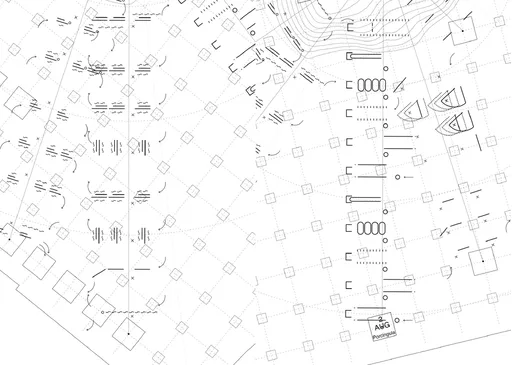
Wanneer inheemse gemeenschappen worden gevraagd om bewijs te tonen van hun traditionele connectie met hun voorouderlijke landen, respecteert wat Westerse legale instanties accepteren als documentatie niet volledig hoe stammencultuur en traditionele manieren van kennisoverdracht werken. Het onderzoeksproject en boek The Language of Secret Proof (2019), geschreven door Nina Valeria Kolowratnik, reageert op de ervaring met de productie van bewijsmateriaal van bewoners in Jemez Pueblo, New Mexico. Dit boek bevecht de omstandigheden waaronder de rechten van inheemse volken om traditioneel land te beschermen en terug te winnen worden behandeld in het wettelijk kader van de Verenigde Staten.

SEA – SHIPPING – SUN (2021) is een korte film en meditatie over maritieme handelsroutes, geregisseerd door Tiffany Sia en Yuri Pattison. De film werd opgenomen over de span van twee jaar, maar is geedit om het eruit te laten zien alsof het één dag is, van zonsopgang tot zonsondergang. De film speelt de soundtrack van scheepsberichten uit het archief van BBC Radio 4 uitzendingen. SEA – SHIPPING – SUN werd gemaakt met de intentie om de kijker slaperig of relaxed te laten voelen, en verzamelt een visie van verstrengeling. Wij worden achtergelaten met de overblijfselen van geschiedenis: een zachte, wiegende waltz over de zee.

In dit essay reageert Amelia Groom op Tehching Hsieh's werk Time Clock Piece (One Year Performance 1980–1981) (1980-1981), een van de stukken die te zien is als onderdeel van de tentoonstelling No Linear Fucking Time bij BAK, basis voor actuele kunst, Utrecht. Door een lezing van het gelijktijdige anti-werk lied 9 to 5 (1980) van Dolly Parton reflecteert Groom op de historische verschuivingen in de manieren waarop werknemers werden en nog steeds worden uitgebuit door technieken van tijdsdiscipline.

Grappling with the imposed linearity of timespace as a fundamental feature of colonial violence, this essay by Promona Sengupta (also known as Captian Pro of the interspecies intergalactic FLINTAQ+ crew of the Spaceship Beben) proposes a mode of time travel that is “untethered from colonial imaginations of the traversability of time and space.” While coloniality has enforced an externalization of time and space as things outside the body, Sengupta affirms practices of relational care and survival that restore time and space as embodied realities.

Weird Times (2021) is een chapbook van 30 pagina's door kunstenaars Tiffany Sia en Yuri Pattison over de tijd aflezen en hegemonie. Het bevat Sia's schrijfwerk en beelden geselecteerd door Pattison, en geeft een korte geschiedenis weer van de ontiwkkeling van technologieën voor tijdregistratie. De klok wordt gedemonteerd als een politiek werktuig, een metronoom van dwang en een versneller van oorlogsmacht. Uit deze mechanieken verschijnen weerstandige ‘counter-tempos'.
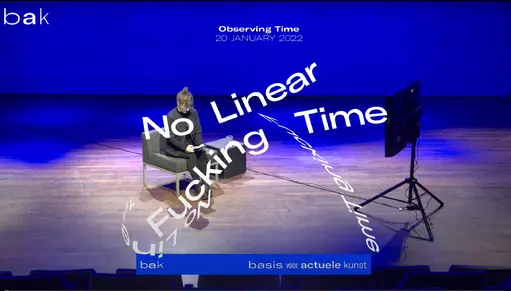
Een online gesprek met performance kunstenaar Tehching Hsieh, schrijver Amelia Groom en schrijver en curator Adrian Heathfield, geleid door Rachael Rakes, BAK curator Public Practice, op 20 januari 2022. Het gesprek neemt Hsieh's werk als uitgangspunt voor het bespreken van onder andere perfomatieve tijd, werktijd, gaten en ritmes van uithoudingsvermogen.

The No Linear Fucking Time Bibliografie is een zich ontwikkelend naslagwerk waarin wetenschappelijke en artistieke teksten worden gebundeld die betrekking hebben op de verscheidene onderzoekslijnen binnen dit project.
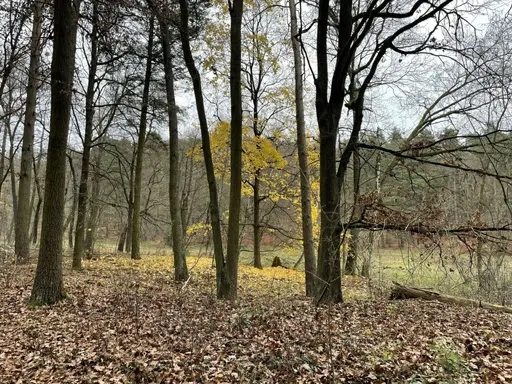
In ‘Reclaiming Time: On Blackness and Landscape’ (voor het eerst gepubliceerd in PN Review issue 257 in 2021), bekijkt dichter en schrijver Jason Allen-Paisant de geracialiseerde maatschappelijke contexten en moderne milieuconstructen die ‘Zwarte levens disproportioneel beroven van de voordelen van tijd.’ Hij put uit zijn poëziebundel Thinking with Trees om een koloniale epistemologie van de natuur te schetsen, en de rol van poëzie te benadrukken in het genereren van vormen van Zwart verwantschap en politiek bewustzijn, gebaseerd op een hernieuwd gevoel van ‘diepe tijd’. De vraag of het mogelijk is om middels poëzie ‘tijd terug te claimen’ staat centraal in de tekst.
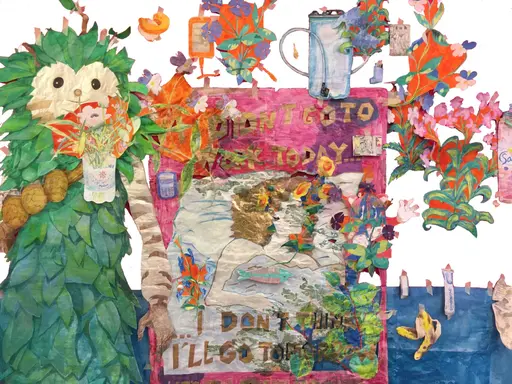
Als hij door de ‘Nothing To Declare’ uitgang van het vliegveld London Stansted loopt, ziet Sam Keogh drie grensbewakers: een varken, een eenhoorn en een bezorgde cartoonklok. Pig Eater is het script voor een monoloog dat voor het eerst opgevoerd werd als onderdeel van Keogh’s tentoonstelling Sated Soldier, Sated Peasant, Sated Scribe, in Goldsmiths Centre for Contemporary Art, Londen in 2021. Het verweeft fantasieën over overvloed en de afschaffing van werk; over feesten en rusten; over sabotage, anachronisme en het ‘opfokken’ van lineaire tijd.

In dit gesprek met Walidah Imarisha (voor het eerst gepubliceerd in Toward the Not Yet: Art as Public Practice, BAK en MIT Press, 2021), schetst de schrijver en activist haar concept van ‘visionaire fictie’ als een verbeeldingspraktijk om toekomsten te verlossen van het bolwerk van lineaire tijd. Imarisha put uit haar werk als strafrechtelijk abolitionist, en spreekt specifiek tot de bewegingen en ideeën die voortkomen uit de Zwarte strijd in de Verenigde Staten. Ze benadrukt dat we ons bij het veranderen van de toekomst moeten verhouden tot het verleden: ‘specifiek vanuit een kader gericht op gedekoloniseerde, niet-lineaire dromen van vrijheid die gegrond zijn in de strijd van gemeenschappen van kleur voor autonomie en bevrijding van kolonialisme.’
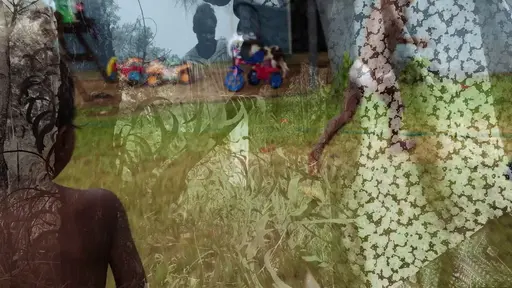
In haar essay ‘In Some Places the Not-Yet Has Long Been Already’ (voor het eerst gepubliceerd in Toward the Not Yet: Art as Public Practice, uitgegeven door BAK, basis voor actuele kunst en MIT Press, 2021) put Elizabeth A. Povinelli uit haar werk als onderdeel van het Karrabing Film Collective. In de tekst contrasteert ze de temporele oriëntatie van het laat-koloniale liberalisme – getroebleerd door de op handen zijnde catastrofes van een totale klimaatinstorting – met de voorouderlijke catastrofes van kolonialiteit en slavernij, die zowel van het verleden als het heden zijn. Deze voorouderlijke catastrofes, aldus Povinelli, ‘blijven groeien uit de grond die kolonialisme en racisme hebben bewerkt, in plaats van op te duiken aan de horizon van liberale vooruitgang.’

‘Dysfluent Waters’ is onderdeel van het multidimensionale project The Clearing van muzikant en schrijver JJJJJerome Ellis, respectievelijk een boek uitgegeven door Wendy’s Subway en een gelijknamig album uitgebracht door NNA Tapes in 2021. Hij ziet het bos en haar open plekken als ‘plaatsen waar al eeuwenlang verzet plaatsvindt middels zwarte gesproken cultuur.’ Ellis onderzoekt hoe stotteren, zwartheid, en muziek een rol kunnen spelen bij verzetspraktijken tegen dominante voorschriften voor de beleving van tijd, spraak en ontmoeting.

In haar tekst ‘Dearest Zen (Letters to Lichen)’ presenteert kunstenaar en wetenschapper Adriana Knouf toekomstige liefdesbrieven aan korstmossen: de samengestelde symbioten van schimmels en algen of cyanobacterieën. Bezien door de lenzen van de ‘xenologie’ (Knouf’s term voor de studie, analyse en ontwikkeling van het vreemde, buitenaardse en andere) en trans*-tijdelijkheden, onderzoekt ze manieren om te leren van, en opgetogen mee te doen met, intimiteiten en uitwisselingen tussen verschillende organismen.

In ‘Immortals: on the Ancient Future Lives of Stone and Plastic’ verweeft Marianne Shaneen verhalen, geschiedenissen en ontologieën van twee materialen: steen en plastic. Als quasi-onsterfelijke substanties zijn steen en plastic getuige van de catastrofale effecten van uitbuitende lineariteit, terwijl hun levensloop veel langer is dan dat van een mensenleven. Dit essay verweeft deze twee materialen, die schommelen tussen het geologische en synthetische, en die diep ingebed zijn in industrieel-kapitalistische ontwikkeling.
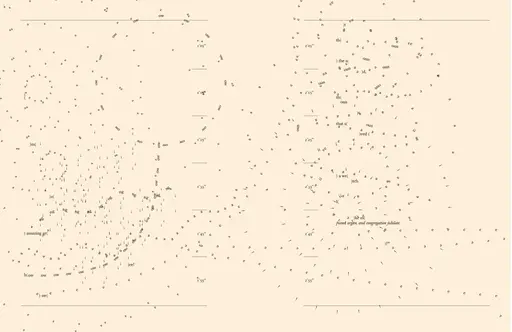
‘The Clearing: Melismatic Palimpsest’ is onderdeel van het multidimensionale project The Clearing van muzikant en schrijver JJJJJerome Ellis, respectievelijk een boek uitgegeven door Wendy’s Subway en een gelijknamig album uitgebracht door NNA Tapes in 2021. Hij ziet het bos en haar open plekken als ‘plaatsen waar al eeuwenlang verzet plaatsvindt middels zwarte gesproken cultuur.’ Ellis onderzoekt hoe stotteren, zwartheid, en muziek een rol kunnen spelen bij verzetspraktijken tegen dominante voorschriften voor de beleving van tijd, spraak en ontmoeting.